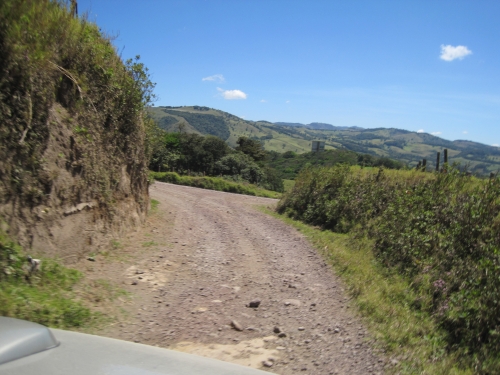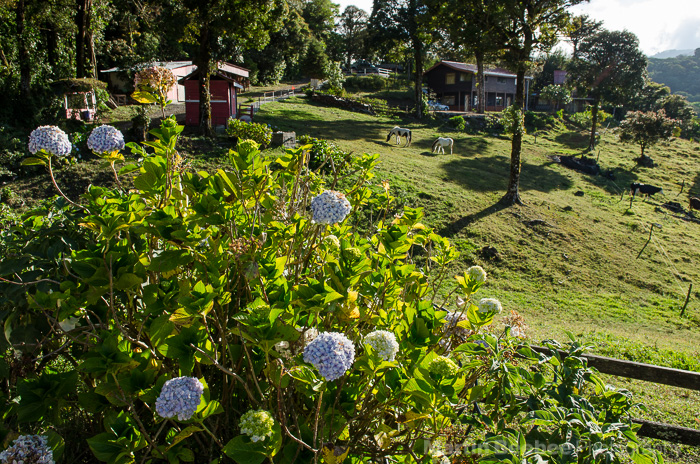Not only was Dakota navigating, he was driving.
Martin and I were pretty much at his mercy when he announced, “I think there might be a birding preserve up here somewhere!” and swerved off the highway.
We were again on dirt roads leading to who-knew-where, jouncing along while Dakota the Navigator monitored his neck hairs and the earth’s magnetic field for which way to turn. The road, wide and well-graded at first, went on and on. It didn’t lead to any birding preserves, of course, but through the Costa Rican backcountry, with funky little houses and fields full of cows or crops, past the occasional little store selling soda. Dakota turned here and there onto secondary roads as his neck hairs dictated, and the road narrowed, the grading worsened.
Truly. Here we go. Again.
Costa Ricans were again stopping to turn and stare at us as we drove past. We were certainly off the beaten path. Dakota kept assuring us that this road “should” connect back up with the main highway to Monteverde, our destination, but of course there “should” have been a birding preserve back there, too.
I began to feel a little embarrassed, or maybe annoyed, undoubtedly stemming from lack of sleep (I’m not sleeping well at all on this trip) as well as general anxiety. We had taken so many turns in the road! If we needed to retrace our way back to the main highway, would we remember which way to turn at this intersection or that fork? It seemed likely we would become hopelessly lost in the backcountry of Costa Rica. Dakota’s neck hairs didn’t always seem perfectly aligned with reality, despite his confident guarantees.
Plus, we were roaring along these dirt roads, kicking up clouds of dust. We would pass people walking or riding their bikes, and we didn’t slow down for them at all. It felt disrespectful to just cover them in a plume of our dust as we flew by. Perhaps Costa Ricans don’t slow down for each other either, maybe the pedestrians expect to be engulfed in a cloud of dust every time someone drives past.
Or maybe we were being the quintessential obnoxious, self-centered, oblivious Americans that people love to hate.
I felt a growing pressure to show some respect to these Costa Ricans, engender some unexpected good will and slow down just a little, give a wide berth, at least make a pretense of an attempt to reduce the dust boiling up at them.
I was tired and irritable, worried about getting lost, and unquestionably tense.
The road continued to grow rockier, more rutted. Even Dakota the Expert Navigator wanted some reassurance that we were, indeed, on a road that connected to the main highway. A car was parked up ahead with the driver inside. Dakota pulled up next to him.
I immediately started apologizing in my broken Spanish for the dust that poured into his car. He waved his hand at the dust, smiled graciously and shrugged. I couldn’t remember the word for “highway,” so I asked if this road led to the “bigger road,” Highway 18.
His answer was classic Central American, eliciting a shout of laughter when I translated it later to Martin and Dakota: “Yes. Just keep going, and turn left when you get to the cows.”
Turn left at the cows!
And sure enough, we came upon an enormous field with tons of happy-looking cows, turned left, and soon afterwards found the highway. Dakota would have made the turn on his own (his neck hairs were clearly indicating left), but the reassurance was nice.
The pavement didn’t last long. We turned up the mountainside towards Monteverde, and the road deteriorated almost immediately into a rocky, bumpy, jarring, rock-strewn, pot-holed mess, and stayed like that for the long bone-rattling journey up the mountain.

The main, well-traveled road to Monteverde. It’s a rocky ride.
Towards the end, I was getting seriously done with dirt roads. Monteverde is one of Costa Rica’s major tourist attractions! Is it too much to ask for a paved road? Or at least a properly-graded and well-maintained one? I gritted my teeth and inwardly fumed.
I know. I’m complaining a lot. I was exhausted and irritable. I didn’t know it at the time, but my perimenopausal hormones were starting to act up.
It would get much, much worse.
We watched the habitat change from dry fields to green trees. Insects started chattering in the foliage, buzzing loudly. The forest got denser, the air got cooler. What a relief to leave that suffocating heat!
The wind picked up as we gained elevation, and was fairly roaring through the trees by the time we finally arrived in Santa Elena, the sister town to Monteverde. And – this was a surprise – it was cold! I went from hot and sticky to chilled and uncomfortable.
Dakota skillfully navigated the bumpy, rocky, unmarked roads to our destination. He turned here and there, seemingly inexplicably as his neck hairs dictated, and suddenly we were pulling into the driveway of the remote ranch. How did he do that? His neck hairs must have been powerfully and fortuitously attuned to the earth’s magnetic field to find this tucked-away place without a map.
The ranch was gorgeous. Perched atop the mountain overlooking the Gulf of Nicoya far below, there were pretty green pastures with happy, frisking, prancing ponies, well-fed cows grazing freely about the entire property, and the friendliest people you could hope to meet.

The pretty ranch in Santa Elena, near Monteverde.
Dakota had a veritable suite to himself. Martin and I had a clean, friendly room directly below him, with wood paneling, tile floors, a spacious bathroom, a table with three chairs, and a kitchen that Martin paid extra for, to minimize eating-out costs.
The “kitchen” turned out to be a small dorm-sized refrigerator, a two-burner electric hotplate balanced precariously on a narrow counter, and a shallow sink. It was stocked with exactly: one wok, a small electric frying pan, two plates, two forks and knives, three glasses, and a coffeemaker. No cooking pots. No spatulas or spoons of any kind, no salt or pepper, no dish towel. Not even a trash can.
Visions of a big pot of pasta with a green salad evaporated. What can you cook in a wok when you have no chopping board or chef’s knife or utensils? When you have no pot for rice or pasta? Not even a can opener?
We elected to ask for a spatula, and go the scrambled-eggs-and-bacon route. As in: breakfast burritos. And dinner burritos. We would ultimately eat burritos nearly daily for the rest of the trip. I would get very, very sick of burritos.
Our room felt chilly. I was cold from the much-cooler mountain temperature and the blustery wind, yet still felt uncomfortably sticky from the morning’s heat in Playa Grande. I needed a nice hot shower.
I wanted to wash off all the heat and stickiness of the day, wash off all the anxiety and frustration of today’s journey, wash off the cold howling wind, wash off the strain of trying to speak (and understand) Spanish — the effort of trying to say things I used to be able to say but now can’t. Words, phrases, verb conjugations, indeed whole paragraphs I used to just rattle off now eluded me. It was frustrating and exhausting. And I haven’t been sleeping well. At all.
Did I mention being exhausted?
I desperately needed a hot shower to wash it all away.
So I stripped off and stood on that cold tile floor, and turned on the hot water… and waited… and waited… and nothing but freezing cold water poured from the shower head.
I couldn’t step into that icy water! I was already cold.
And a little seed of strain and unhappiness that had been looking for a foothold in the pit of my stomach suddenly blossomed into something that filled up my whole chest.
This trip was not going as planned. It seemed there was something wrong, everywhere I turned. The weather is too hot and humid. No it’s not, the weather is too cold and windy. The bathroom smells of sewage. There are big red ants swarming over the bed. The lights are too dim for us to see our belongings. No they’re not, the lights are too bright for the turtles to lay their eggs. The roads are rocky and rutted and teeth-rattlingly jarring. The sound of traffic keeps me awake at night. No it doesn’t, the roar of fans keeps me awake at night. The kitchens we pay extra for are completely nonfunctional.
And there’s never any goddamn hot water.
So I stood shivering in the cold air, standing on the icy tile with a pinched chest, listening to the wind shriek outside while freezing cold water poured from the shower head, and was suddenly ready to cry.
I was also struggling with a growing and inexplicable jealousy of Dakota and his relationship with Martin. They are lifelong friends, practically brothers, with years of traveling, camping, backpacking, and birding together. They have a plethora of jokes and shared interests and experiences, resulting in loud and animated conversations, debates, and banter.
So they talked, laughed, debated, and birded together, and I just felt left out. I couldn’t even see the stupid birds that they, together, were admiring. What was the point of my being there at all?
I told you my hormones were acting up.
I was due for my period in a week (right about the time all three of us would be sharing a single room in an ecolodge, how special is that?). I usually don’t get PMS. But here I was, unexpectedly wrestling with hurt feelings, jealousy, irritability, and bursts of anger.
I just didn’t see it coming.
Turning the shower handles in despair, I discovered that the hot and cold water pipes were reversed. Turning the cold handle produced hot water, so I did indeed get my much-needed hot shower, for which I was very grateful.
But my chest still felt pinched and tight.
That night, the relentlessly howling wind and a barking dog totally disrupted my sleep.

You are such a skilled writer. When I read what you have written, I feel like I am right there, which now means I feel hot, cold, dirty, irritable and jealous. Thanks a lot! 🙂
It’s just gonna get worse, baby.
Pingback: Monteverde: Struggling to Breathe - Carol Beebee